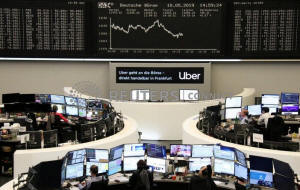|
U.S.-China trade setback prolongs the
global equities slide
 Send a link to a friend
Send a link to a friend
 [May 13, 2019]
By Thyagaraju Adinarayan [May 13, 2019]
By Thyagaraju Adinarayan
LONDON (Reuters) - Global equities fell on
Monday after their worst week of 2019, as hopes of an imminent
U.S.-China trade deal were crushed and neither side showed a willingness
to budge, raising fears of a fresh round of tit-for-tat tariffs.
The United States and China appeared at a deadlock over trade
negotiations on Sunday as Washington demanded promises of concrete
changes to Chinese law and Beijing said it would not swallow any "bitter
fruit" that harmed its interests.
"Looks like we are just slowly ebbing away. More tweets from Trump over
the weekend stoking the fires for a trade war," said John Woolfitt at
London-based Atlantic Markets.
The impasse left investors bracing for threatened retaliation by China
for Washington's tariff increase on Friday on $200 billion worth of
Chinese goods. The move followed accusations by U.S. President Donald
Trump that Beijing had reneged on earlier commitments.

The pan-European Stoxx 600 slipped 0.7% while S&P 500 futures shed 1.3%.
Chinese shares tumbled, with the benchmark Shanghai Composite and the
blue-chip CSI 300 shedding 1.2% and 1.8%, respectively, while Hong
Kong's financial markets were closed for a holiday.
Japan's Nikkei average sank as much as 1.0% to hit its lowest level
since March 28, before closing down 0.7%.
"How far this escalates is what the market is really worried about as we
haven't really got full details of what the U.S. will do and how China
will retaliate. The important thing is what's the impact on growth, and
that's what the market is really fearing," said Justin Oneukwusi,
portfolio manager at Legal & General Investment Management.
White House economic adviser Larry Kudlow told the "Fox News Sunday"
program that China needed to agree to "very strong" enforcement
provisions to secure a deal. He said the sticking point was Beijing's
reluctance to put into law changes that had been agreed.
Kudlow said U.S. tariffs would remain in place while negotiations
continued and there was a strong possibility that Trump would meet
Chinese President Xi Jinping at a G20 summit in Japan in late June.
"The risk of a full-blown trade war has materially increased, even
though both sides seem to still want a trade deal and talks are expected
to continue," UBS economist Tao Wang said.

Washington said it was preparing to raise tariffs on all remaining
imports from China, worth approximately $300 billion.
[to top of second column]
|

The German share price index DAX graph is pictured at the stock
exchange in Frankfurt, Germany, May 10, 2019. REUTERS/Staff

"Our base case is for limited progress and Chinese retaliation,"
said Michael Hanson, head of global macro strategy at TD Securities.
The offshore Chinese yuan fell to its lowest levels in more than
four months at 6.90 to the dollar.
Major currencies were relatively calm with the euro steady at
$1.1230, while the dollar was little changed against a basket of
currencies at 97.324.
The U.S. Treasury bond yield curve between three-month and 10-year
rates inverted on Monday for the second time in a week, with the
10-year yield now standing 0.0025% above the shorter-maturity bill.
Viewed as a classic warning signal of a looming U.S. recession, the
curve inverted last Thursday for the first time since March,.
The U.S. curve has inverted before each recession in the past 50
years. It offered a false signal just once in that time.
"Overall in the short term the chances of recession have increased,"
Legal & General's Oneukwusi said.
The trade war hit emerging market stocks, which were down 0.7
percent, hovering near January lows.
JPMorgan said it had reduced its emerging markets risk for the
second time in as many months on Monday following the set-back in
U.S-China trade talks.

In commodities, oil futures rose on increasing concerns about supply
disruptions in the crucial producing region of the Middle East.
Brent crude futures rose 0.5% to $71.00 a barrel and U.S. West Texas
Intermediate futures were up marginally at $61.73 per barrel.
In digital currencies, Bitcoin continued to move higher, holding
onto gains over weekend. Bitcoin jumped more than 10% on Saturday
and marked a nine-month high of $7,585.00 on Sunday.
Graphic: World FX rates in 2019 - http://tmsnrt.rs/2egbfVh
(Reporting by Thyagaraju Adinarayan, additional reporting by Sujata
Rao; Editing by Jon Boyle)
[© 2019 Thomson Reuters. All rights
reserved.]
Copyright 2019 Reuters. All rights reserved. This material may not be published,
broadcast, rewritten or redistributed.
Thompson Reuters is solely responsible for this content. |